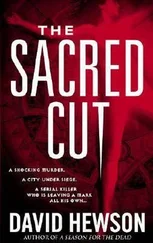And then, smiling at her, trying to see into those dark, frightened eyes. “Laura. I know you had nothing to do with Scacchi’s death, or that of those police officers. I will provide everything at my disposal to prove it. You will be free. I promise that. There is nothing to fear.”
He touched her cheap, faded shirt, until Costa, under the glaring eye of Forster, removed his hand.
“You need clothes,” Massiter said to her. “A lawyer. Somewhere to stay. And some time in which we may reacquaint ourselves.”
“You will come with us!” Costa ordered. “Now. This is a criminal investigation, and you’re a material witness.”
He glanced at the Arcangeli. All of them too cowed, too miserable, to say a word.
“Oh, please!” Massiter said. “I’ve a party to go to! And—and many important people to see. People you would not wish me to disappoint.”
“You must join us now, sir!” the Carabinieri major demanded. “By nine o’clock at the latest you can return. Then have your party! Then sign your contract!”
They were so transparent. So idiotic.
“But, gentlemen,” Massiter complained, “there’s no need! The Arcangeli and I grew tired of dickering more than an hour ago. The contract’s signed already. The deed’s done. Several million euros are now on the way from the state and the city into my bank accounts, a few million on the way to theirs. All we’re waiting for is the presence of the mayor and then I can break the good news to the parasites down below.” He paused, allowing this to sink in. “The Isola degli Arcangeli is mine. And everything that goes with it. Every bureaucrat, every hack politician, every avaricious cop. You may take Forster to jail. You will take Laura to my lawyer, and then, when she’s bailed, on my surety, to a hotel of my choosing. But for now . . .”
Still, they didn’t give up. Two more were marching up the stairs.

THERE WAS A MOB OF DINNER JACKETS AND EVENING gowns all around her, a heavy brew of accents fighting for attention over the music. Teresa Lupo wanted to yell at them to shut their quacking mouths. Silvio had got through with a result, one that was early for some reason she couldn’t hear over the din. What Alberto Tosi had said kept running round her head too, not making any sense at all, not in the neatly aligned series of facts and suspicions they’d been chasing so hard these past few days.
She stood on the steps of Ca’ degli Angeli, aware that Peroni and Nic had gone ahead with the rest of them, trying to separate Silvio’s tinny squeaking in her ear from the racket all around her.
Then a waiter drifted into view, proffered a silver platter of canapés in her face. She gave him a desperate glance.
“Do me a favour. I just got a call to say my uncle died. I need a little quiet. Can you move these people along?”
The waiter’s flat, unemotional face suddenly flickered with sympathy. “Signora! I am so sorry. Of course.”
He was busy in a flash, shooing with a white-gloved hand, shushing them into a semblance of silence.
Finally, she could listen again to Silvio’s babbling and hear what he was saying, making a mental note to herself as she did that it really was time to sit down with her assistant and teach him not to get overexcited at tense moments.
“Silvio, Silvio . . . Calm down.”
A heavy shoulder in grubby black brushed against hers. Instinctively she pulled back, aware this was the boatman, who didn’t appear too clean from afar, or too bright from close up. He was covered in muck and ash, and holding a long bundle of kindling twigs tightly, both arms underneath the wood, striding into the entrance of the house, towards the broad marble stairs, intent on something, a fixed, hurt expression on his face.
Then she listened to Silvio one last time, relieved that he finally managed to say what he meant to.
Quick decisions. She both hated and adored them. She dropped the phone back in her pocket and followed in the steps of the boatman, trying to avoid the chunks of twig that marked his path, thinking, desperately trying to find some way through what she knew.
Teresa Lupo rounded the staircase and saw the open door to the large, handsome room where they were all gathered. The warm yellow light of the sun streamed through those curious windows she’d noticed from outside. Hugo Massiter, a man she’d only seen twice, once on a launch in the Grand Canal, once in the palazzo next door, stood in the centre of the room looking as if he owned everything around him already. The bricks, the mortar, but most of all the people.
“Nic . . .” she said, but no one was listening, no one was doing anything but look at the boatman, who shuffled stupidly, like an idiot, ahead of her, clutching the bundle of kindling in his arms.
It was the oldest Arcangelo who spoke first. Michele got out of his seat, one good eye flashing hatred and fury, emotions, she thought, that had been looking for somewhere to escape long before this poor, dumb native wandered into the room.
“What are you doing, you idiot?” Michele bellowed. “What are you doing ?”
There was a brief quiet lull. It felt like being in the eye of a storm.
“I thought you’d need firewood,” the boatman said in a dull, detached brogue as coarse as his clothing. “They told me you’d still be working, Signor Michele. If you work, you need help.”
The couple she’d seen in handcuffs were there, trying to hold one another, trying to form some sort of bulwark against everything that surrounded them.
“Go, Piero,” the young man said, half choking on the words. “There’s nothing more you can do.”
“Do?” the boatman wondered.
The young woman was sobbing, hating something about the sight of the boatman. Or fearing it, perhaps.
“Piero,” she pleaded. “Listen to me! Go! ”
Michele Arcangelo walked up to the man, slapped him as hard as he could, twice across the face, front of hand, back of hand, screaming, with so much force Teresa could feel the hatred welling up from the man as he raged in front of them.
“ Matto! Matto! Matto! Get out of here!”
But he didn’t flinch. He was looking at the Englishman now. Massiter stood there, amused, arms folded, feet apart, the stance of a victor.
Nic, she said or whispered or simply thought, Teresa Lupo wasn’t quite sure.
“Signor Massiter,” the boatman said in a calm, thoughtful voice, one that seemed more assured, and rather more intelligent, than she’d expected.
“You know my name?” The Englishman beamed. “I’m flattered.”
“I know your name,” he said, nodding. Then he turned to look at the couple.
“Another Scacchi warned us about you, long ago. You cannot run from the Devil, he said. The Devil always finds you. Or you find him.”
“Piero, Piero!”
It was Gianni Peroni, working his way towards the boatman now, with the kind of swift, certain intent she’d come to recognise. The big cop could wrestle a man down in an instant if the sweet talk didn’t work.
“No one moves,” the boatman said, and released the bundle of kindling, let the twigs fall noisily onto the polished floor and the shining table, sending Michele Arcangelo into a paroxysm of screaming, foulmouthed wrath once more. Until . . .
“Nic,” Teresa said, and heard her own voice faintly over the sudden silence.
“No one moves.”
They froze. Not one of them—not Nic, not Peroni, or even Luca Zecchini—felt like trying to steal a finger towards the pistols in their jackets. Something in the man’s face told them this would be a very bad idea indeed.
Читать дальше













